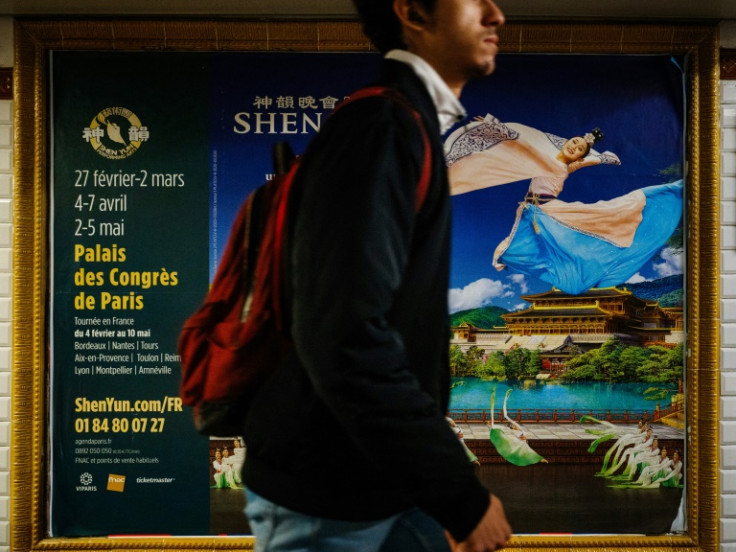
An image of a dancer balancing on the words "China Before Communism" looms over Parisian commuters catching the morning metro, signalling the annual return of Shen Yun, a controversial spectacle of traditional Chinese dance mixed with vehement criticism of Beijing and conservative rhetoric.
The Shen Yun Performing Arts company has slipped the beliefs of a spiritual movement called Falun Gong in between its technicoloured visuals and leaping dancers since 2006, with advertising for the show so ubiquitous that it has become an internet meme in recent years.
Founded in 1992, Falun Gong claims nearly 100 million followers and has been subject to "persistent persecution" in China, according to a January 2024 European Parliament resolution.
Shen Yun aims to "revive 5,000 years of traditional Chinese culture", which the group says Beijing has nearly succeeded in destroying.
Atheism, evolution, and the Chinese Communist Party (CCP) are just some of the topics targeted during the show's roughly two-hour run time.
China banned Falun Gong, which it calls an "evil cult", in 1999 after 10,000 members peacefully demonstrated outside a government building in Beijing.
But the movement has found a global audience, performing Shen Yun in cities across the world every year and generating revenues of $46 million in 2022 alone, according to the ProPublica investigative news site.
In front of some 2,000 spectators in the French city of Tours, a soprano sings to a divine power, castigating "modern thoughts" that are "corrupting" humanity.
The audience then watches as Chinese police chase peaceful demonstrators before one of the officers has a change of heart, becoming "aware that greater forces may be at work", according to the programme.
The demonstrators portrayed in the scene are members of Falun Gong -- but adverts for the performance do not spell this out.
"Shen Yun is obviously a facade to promote Li Hongzhi's ideas and recruit new members," said Marc Lebranchu, a researcher in traditional Chinese practices at the Ecole Pratique des Hautes Etudes in Paris.
Li Hongzhi, the founder of Falun Gong, is a controversial figure who fled China in 1998, seeking political asylum.
In a 1991 Time magazine interview, Hongzhi portrayed himself as the saviour of humanity and claimed aliens were trying to replace humans.
French anti-cult association Unadfi said the movement's leader has made racist remarks about those with multiracial backgrounds and in a 2017 report accused Falun Gong of having "less than tolerant views of homosexuality".
However, Unadfi spokesperson Pascale Duval said no similar accusations have been levelled in France "for at least five or six years".
The group has also been criticised for its proximity to the ultra-conservative movement in the United States.
Between 2018 and 2019 a Falun Gong-affiliated media outlet called The Epoch Times paid more than $1.5 million for around 11,000 pro-Trump ads on Facebook over a six-month period, some of which peddled conspiracy theories, according to NBC News.
AFP made several attempts to contact Falun Gong's French-based branch but did not receive a response.
Beijing initially saw the movement's promotion of qi gong -- a gentle exercise from traditional Chinese medicine -- as a low-cost way to maintain public health, but the Chinese regime banned the group when it started to threaten the CCP's dominance.
Since then, "tens of thousands of Falun Gong practitioners have been arbitrarily detained, many of them tortured", according to Amnesty International.
In January 2024, the European Parliament accused the CCP of engaging in "systematic persecution to eradicate the Falun Gong religious movement".
China has repeatedly faced accusations of forced organ harvesting from prisoners and in particular, members of Falun Gong.
The Chinese consulate in France's southern city of Marseille called these claims "fabricated" and urged French audiences to "stay away" from Shen Yun last year, calling it a "political tool".
Chinese authorities have made several attempts -- some successful -- to force the cities to cancel Shen Yun performances.
In 2008, the Chinese Embassy in Sweden lobbied the city of Stockholm to ban the show, but the city told AFP that the attempt was unsuccessful.
They had more luck in South Korea in 2016 when a court issued an order cancelling shows over financial threats from the Chinese embassy.
Edouard, a 67-year-old retiree, was too "dazzled by the juxtaposition of the dancers and visuals" to notice any controversy during the show in Tours.
He told AFP that he had never heard of the persecution of Falun Gong, but after seeing the show, he seemed convinced.
"It's a reality, and it needs to be known," he said.









